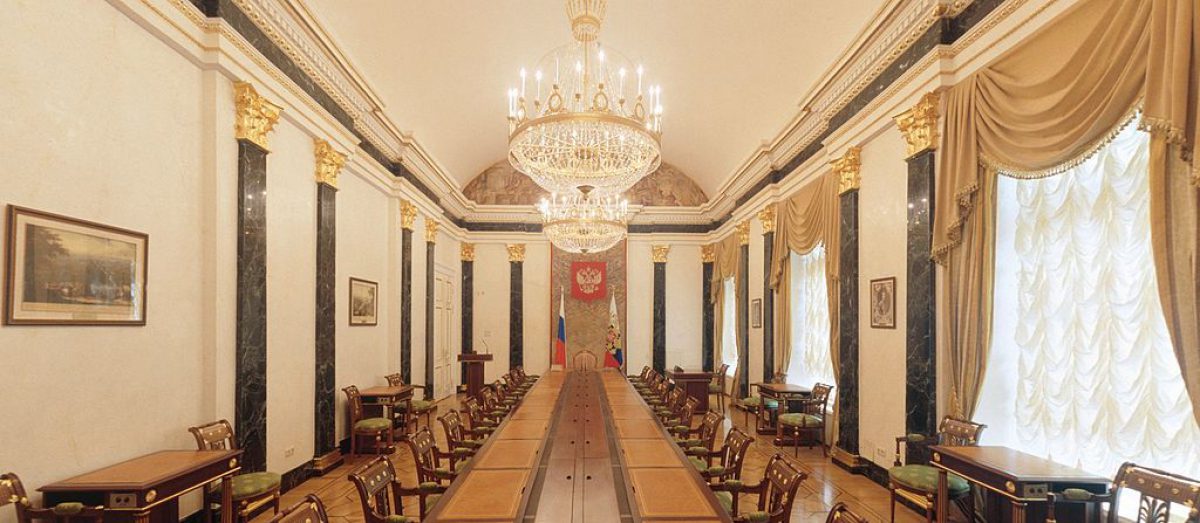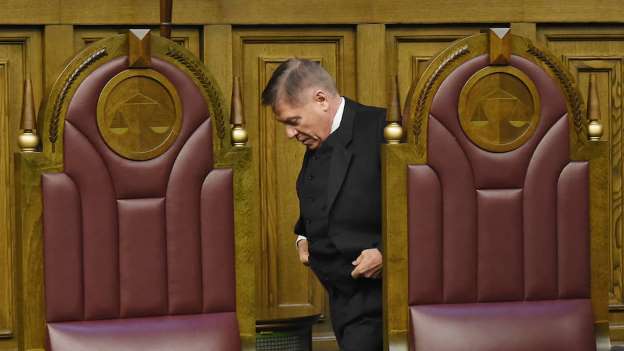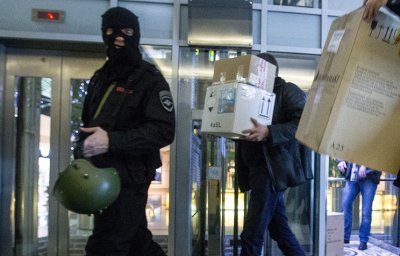
The bankruptcy of T-Platforms, once the undisputed leader in Russian supercomputers, wrapped early this past October. The tale of its liquidation and the ruination of its founder, Vsevolod Opanasenko, encapsulates the double-bind confronting Russian tech entrepreneurs today: choose to keep a low profile and never realize your full commercial potential or grow big with government funding on terms that leave you vulnerable to abuse from unscrupulous competitors working with corrupt law enforcement. The history of T-Platforms’ folding illustrates that very real dangers these entrepreneurs face when deciding whether to accept the support of the Russian state.
The circumstances behind T-Platforms’ bankruptcy and Opanasenko’s fall from grace suggest that the prevailing Putinist political economy , which tolerates predation on private business by state officials and private citizens alike in return for political fealty, may undermine the Kremlin’s efforts to attain “digital sovereignty“. The bureaucratic rapacity evidenced in the T-Platforms saga will metastasize: the more resources the Kremlin allocates to maintaining a neglected domestic microelectronics sector beset by punitive US and allied export controls, the greater the feeding frenzy for access to those resources among interested parties both within and without the Russian state. Tech entrepreneurs caught up in this frenzy run a worryingly fair chance of ending up behind bars.
T-Platforms’ story is in many ways the story of its founder, Opanasenko, who began his career under the tutelage of physicist and senior Soviet Academy of Sciences principal Yevgeny Velikhov (perhaps best known as being the man who first brought Japanese computers to the Soviet Union). A perestroika wunderkind, Opanasenko claimed in one undated interview to have received a tape player and a medal from the Soviet government for helping make a graphics library for Japanese video game company Konami.
Opanasenko subsequently studied at the K.E. Tsiolkovsky Russian State Technological University, where he had a profitable side-hustle in the form of a PC import business he named Micronic. So successful was Micronic that by the early 2000s it had managed to buy an entire PC peripherals factory in China. Nonetheless, pricing wars between Micronic and competing peripherals importers made it a less than profitable enterprise. Opanasenko sold off the Chinese plant in 2002 to focus on the supercomputer sector, the competition in Russia for that market being negligible and the profit margins considerable.
Opanasenko parlayed the proceeds from the 2002 sale of Micronic’s Chinese factory to set up T-Platforms that same year. His timing could not have been more perfect, as rising prices over the next decade gradually eased the trauma of Russia’s 1998 financial crisis and stimulated demand among Russian universities and firms for access to supercomputers’ potential to generate unique scientific insights and unlock hitherto hidden business opportunities (which are of course not necessarily mutually exclusive).
T-Platforms first struck big as a participant in “Supercomputer Initiative Feniks” or SKIF, а joint Russo-Belarusian program aimed at providing universities and research in those countries with access to supercomputing platforms. With backing from the Russian Ministry of Industry and Trade (Minpromtorg) and the Belarusian Academy of Sciences, T-Platforms developed the SKIF-1000 supercomputer for a cool $2 million. Opanasenko’s company subsequently built on this success by developing a series of turnkey supercomputers for various Russian universities throughout the 2000s.
T-Platforms scored again in November 2009 with the rollout of the “Lomonosov” supercomputer, which the company developed for use by Moscow State University (MGU). MGU loaned the Lomonosov’s computing power to everyone from pharmaceutical researchers to boffins seeking models capable of forecasting Russia’s socioeconomic development over the next five decades. Such was T-Platforms’ success and appeal that in October 2010 Vneshekonombank obtained a 10% stake in the company, which Opanasenko said would help T-Platforms become a contender in the global supercomputing arena.
By 2012, T-Platforms had launched a chip design business under the name Baikal Electronics, had already managed to secure more than 200 international patents and was opening offices in Hong Kong, Hannover, and Palo Alto – the heart of America’s Silicon Valley. Opanasenko described these ventures to Ъ as being akin to “stepping into the domain of monsters’ – namely, more developed, established software and computer companies in Europe, the United States, and East Asia. Little did Opanasenko realize that other, more immediate concerns awaited him closer to home.
T-Platforms’ downfall began, ironically, with a success: a November 2016 contract to supply Russia’s Interior Ministry (MVD) with computers containing a new chip design by the company’s chip design arm, Baikal Electronics, which had by then attracted VEB and state tech incubator Rosnano as investors. Awarded for RUB 357 million, the contract required T-Platforms (there were no other bidders) to supply 9,348 computers containing Baikal Electronics’ new Baikal T-1 microprocessor for use in MVD-run driver license tests.
The deal proved a disaster. The Nevember 2016 contract required T-Platforms to deliver the 9,348 computers to the MVD by no later than 1 July 2017. The company ended up sourcing just 1,837 computers and, to make matters worse, delivered those units nearly a month after the 1 July deadline. The MVD refused delivery and T-Platforms filed suit to extract payment. T-Platforms asserted that the deal fell through because the MVD withheld advance payment and necessary information, but the claim went nowhere in court.
Weighing in on the matter, Russia’s Federal Anti-monopoly Service (FAS) rejected T-Platforms’ argument that MVD had tanked the contract and started investigating the November 2016 deal along with a separate supercomputer contract awarded to T-Platforms by Rosatom’s Kurchatov Institute. One anonymous Vedomosti IT industry source offered that T-Platforms had been greedy because it had not solicited certain unspecified partners to help implement the contract. Others noted that Russian state customers seldom revise delivery timelines while Russian law enforcement tracks contractual delays closely, a legal liability nightmare replete with potential for civil litigation, if not criminal prosecution.
Although Vedomosti‘s IT industry sources generally agreed that T-Platforms shouldered much of the blame for the contract’s failure, they also concurred that Russia’s federal procurement system exposed contractors to considerable pressure from regulators and federal law enforcement. Public procurement contracts of course merit close monitoring, not least given that the funds disbursed under such contracts ultimately come from the public’s purse. Routine monitoring crosses a line, however, when state monitors fabricate legal and regulatory against companies on behalf of private patrons interested in seizing those companies’ assets. The available evidence, though circumstantial, indicates Opanasenko and T-Platforms might have fallen victim to just such a scenario.
The troubles began in October 2017, when agents with FSB’s M Directorate arrested Andrey Nechaev. According to Ъ, Russia’s Investigative Committee (SK) had taken an interest in certain contracts that Nechaev had approved in his capacity as one of MVD’s lead IT engineers. The FSB reportedly broadcast quite literally Nechaev on the sidelines of a flashy Moscow tech expo, a spectacle that was picked up by Russian state media – a possible sign of the weight assigned to the unfolding case.
Matters escalated decisively on March 27, 2019, when a Moscow court jailed Opanasenko and the then-head of the MVD’s IT department, Alexander Alexandrov. SK reportedly arrested both men on criminal abuse of power charges in connection to the November 2016 driver’s test computer contract. In February 2020, the investigative agency added two fraud charges against Opanasenko on the grounds that he and Baikal Electronics – T-Platforms’ chip design affiliate – had defrauded MVD by delivering computers with subpar processors.
Opanasenko found a prominent advocate early on in Anatoly Chubais, the head of Baikal investor Rosnano. Speaking to Forbes Russia in October 2019, Chubais hailed Opanasenko as one of Russia’s most important innovators and decried his jailing as “a crude violation of the law”. Chubais, who left Russia over Putin’s escalation of the Ukraine conflict in February 2022, is currently under investigation in connection to his tenure as Rosnano chief between 2010 and 2020, during which time the company allegedly accumulated upwards of $3.5 billion in debt. Boris Titov, Putin’s entrepreneur rights tsar, was another of Opanasenko’s supporters. In a December 2020 interview with Vedomosti, Titov maintained that the MVD had mishandled the November 2016 deal and thus compromised – maybe deliberately – T-Platforms’ ability to fulfill its contractual obligations.
T-Platforms’ troubles did not end with Opanasenko’s March 2019 arrest, however, as Russia’s Federal Tax Service (FNS) and several business partners also filed involuntary bankruptcy claims against the company. By December 2019, T-Platforms had lost up to 80% its employees, prompting its press service to decry VEB’s lack of support for the company in the wake of Opanasenko’s jailing. That same month, Vedomosti reported that the Russian government was considering transferring control of T-Platforms to VEB subsidiary NM-Tekh – the very same company that employed Frolov as a general director.
Titov and Chubais stopped short of identifying the person or persons they thought might be responsible for T-Platforms’ and Opanasenko’s legal woes. Insofar as there exists any one person who might have had a stake in Opanasenko’s prosecution, Denis Frolov appears to be the most likely candidate. In late October 2020, Ъ reported that Varton, the CEO of LED light manufacturer Varton, was in talks to purchase a 60% stake in Baikal Electronics. How exactly Frolov and Varton planned to finance the estimated RUB 4 billion transaction was never clear.
VEB – by now аn backer both of T-Platforms and Baikal Electronics – may have positioned Frolov to negotiating this deal on VEB’s behalf. Frolov wore many hats outside of his work for Varton, the most remarkable being his role as the general director of VEB subsidiary NM-Tekh. Varton successfully negotiated a 70% stake in Baikal Electronics in late June 2021. Sources interviewed by Ъ estimated the chip designer’s worth at around RUB 3-6 billion – a valuation, the business paper noted, that was largely reflective of increased demand for import substitution in the microelectronics sector.
These details, while sketchy, show that Frolov, a person affiliated with VEB, took advantage of T-Platforms’ and Opanasenko’s legal troubles to buy a majority stake in Baikal Electronics. This arrangement notionally benefited VEB by placing in charge of Baikal Electronics a known quantity who could help VEB access whatever subsidies the Kremlin might extend to the chip designer. But this is admittedly only a theory.
What is not a theory is that SK agents searched Frolov’s home and brought him in for questioning the following October. Frolov’s attorney claimed that SK had interviewed his client as a witness in an investigation into a separate matter involving a scheme to bribe police into prosecuting Alexander Kalinin, the president of Russian IT giant National Computer Corporation (NKK). Here it’s worth noting that NKK appointed Frolov to Kalinin’s post not long before Varton gained its majority holding in Baikal Electronics. A more thorough accounting of Frolov’s dealings with NKK and Kalinin is, regrettably, beyond the scope of the present summary.
Some commentators, such as The Moscow Post, have obliquely hinted that Frolov’s activities vis-a-vis Baikal Electronics evidenced a Machiavellian contest for control of the Russian microelectronics industry between VEB chief and former deputy PM Igor Shuvalov, on the one side, and Rostec chief Sergey Chemezov and his supposed protégé, Minpromtorg head Denis Manturov, on the other. Such claims are difficult to substantiate – not least given The Moscow Post’s proclivity for running scurrilous rumors about the Kremlin’s liberal technocrat camp – are not wholly implausible. Putin’s subordinates have, after all, waged turf wars over less (see the Three Whales scandal).
Т-Platforms’ prospects were revived briefly in November 2020 when FNS withdrew its involuntary bankruptcy complaint against the company. It even brought on a new general director and embarked on a hiring spree in anticipation of “returning to the market”. No such return ever materialized, however, as several other private creditors continued to push for T-Platforms’ liquidation. Matters finally came to a head in October 2021, when T-Platforms itself filed for voluntary bankruptcy after Minpromtorg filed a claim against the company for RUB 2.76 billion.
Opanasenko was finally freed in January 2022, by which time he had spent 34 months behind bars and under house arrest. In March 2022, CNews.ru, citing anonymous sources, reported that Rostec had hired Opanasenko to “high position”, though none of them agreed on the exact details of his appointment. Yet Opanasenko suffered another personaly setback when, in August 2022, a court ordered him to pay VEB RUB 1.65 billion in fines. The ruling appears to have pushed Opanasenko to file for bankruptcy the following month. The criminal case against Opanasenko and Alexandrovich, meanwhile, remained open in Moscow’s Meshchanskiy Court City Court as of early this past September. Opanasenko’s fate remains in limbo.
Russian tech industry analyst Valeriya Brusnikina neatly summarized the issue behind T-Platforms’ undoing in a January 2022 interview with Skillbox.ru. Commenting on public procurement contracts, Brusnikina observed that “state financing is always accompanied by heightened scrutiny from law enforcement structures and core ministries and agencies”. The “heightened scrutiny” that brought down T-Platforms and Opanasenko will continue to suffuse the Russian tech industry with an atmosphere of distrust where no real risks can be taken and thus no rewards reaped. Those tech entrepreneurs who remain in Russia may do well to remember what happened to Opanasenko before accepting support from the federal government. The Kremlin cannot expect to preserve and expend Russia’s productive technological capacity if it does not afford hi-tech ventures some guarantee of protection from predatory state networks and their commercial accomplices.



